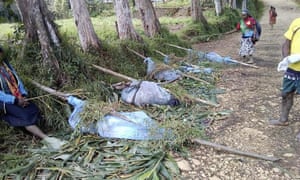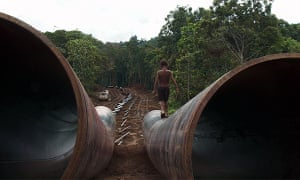
By Jo Chandler - The Guardian
The pictures that came out of a remote highlands village in Papua New Guinea two weeks ago were not, at first glance, particularly graphic: bulging cocoons of blue mosquito nets hanging from wooden poles propped along a roadside.
But the story they told was gruesome.
The nets, said the health worker in Karida village who supplied them, held the remains of 10 women, six children and two unborn babies, all hacked to death with machetes sometime before dawn on 8 July. The health worker told the Guardian they had not been able to work out which body parts belonged to which person.
The slaughter, which occurred in the mountains of Hela province, about 600 kilometres north west of the PNG capital of Port Moresby, followed the killing of three women and four men in a neighbouring village the day before.
The photographs showed the remains being watched over by a pair of elderly women waving branches – fending off flies in the tropical heat. This small rite of respect required immense courage. The killings scattered hundreds of terrified people into the surrounding bush, where many remain today.
“I am so worried about my women,” says Janet Koriama, president of the Hela Council of Women over the phone from the local capital of Tari, having just spent a night near the scene of the massacre. “Families have lost everything,” says Koriama – their food gardens, shelter, clothes. Last Wednesday, Koriama says another woman was killed “and one had her hand cut off while looking for food to feed their hungry children”.
Koriama is desperately trying to enlist defence forces to bring around 2,000 women and children displaced by tribal fighting into shelters she’s coordinating with local churches. But reports indicate that while soldiers have been deployed as promised by prime minister James Marape, who is also the local MP for the area, their mission is focused on capturing the killers, dead or alive.
Even if they succeed, this will be of little comfort to Koriama and other local leaders fearful about what this massacre signals. While tribal conflict is deep rooted in Hela, they describe what happened in Karida village as unprecedented in lore or memory.
“This, I have never seen in my life,” bereft local chief Hokoko Minape told PNG journalist Scott Waide.
Police Minister Bryan Kramer declared his concern that the killings “changed everything … that it will become the new trend”.
Close observers of events in Hela are similarly appalled, but rather less surprised. The killings follow years of escalating violence in a landscape untouched by Europeans only 85 years ago, but which is today the powerhouse of the nation’s resources economy.
Australian National University anthropologist Dr Chris Ballard, who has spent many years living with and researching the area’s dominant Huli population, agrees with local observations that the massacre falls outside even the eroded rules of tribal warfare. Before European contact, these constraints “managed fighting quite effectively,” he says.
“Even in the worst cases of warfare where entire clans were forced off their territory, casualties were pretty minimal and they were almost always fighting men.” Given dense webs of social connection and strict requirements around paying compensation for deaths, random killing were considered “truly dumb”.
“Nobody was interested in mass death. The cost of having to fork out pigs for compensation for death placed limits on what people were prepared to even envisage.”
Today locals live in constant fear and Hela is a virtual no-go zone to outsiders despite the fact that the recent atrocities played out barely 30 kilometres, as the helicopter flies, from the fortified compounds that are the heart of the nation’s largest resources project, the $US19 billion Exxon-Mobil led PNGLNG (Liquefied Natural Gas).
There is widespread distress in the highlands over unrealised promises around this enterprise and explosive anger at the failure of royalties to flow to landowners in the gas fields despite five years of operations. The Huli, famous for their elaborate wigs and face paint, are also fearsome fighters. Sharing, caring and loving, says Janet Koriama – just don’t take what is ours.
The maelstrom of the LNG fallout, old enmities, new jealousies, deteriorating basic services and, last year, a devastating 7.5 magnitude earthquake, underwrites a spiralling social emergency in which tribal fighting has razed villages, closed schools, displaced communities and caused an unknown toll of casualties.
The old rules constraining warfare have broken down in recent decades, , Ballard says. By 2008 – when the PNGLNG building phase was at its height – Medecins Sans Frontieres installed a surgical team at Tari Hospital because casualties from tribal and family violence were equivalent to a war zone. Janet Koriama says traditional protections for women have eroded notably over the lifetime of the LNG project.
Peter Botten, PNG resources veteran and longtime chief executive of Oil Search – the junior partner in the PNGLNG – has argued that blaming resources projects for rising violence in the highlands is too simplistic. He points to myriad changes, from the arrival of mobile phones to rollercoaster modernisation, but says most fights are still about women and pigs. Koriama says that the massacre at Karida is linked to a four-year war which began over a girl and which has now amassed a body count of 80.
“It is part of the story, part of the landscape. The politics of the LNG, and the ramping up of political rivalries, has certainly augmented the flow of weaponry into the Tari area.”A spokeperson for Exxon-Mobil said the recent killings “occurred outside of our operational areas”. Ballard argues that while there may not be straight lines of connection between fallout from the gas project and specific outbreaks of fighting, it’s impossible to disentangle the two.
Tensions in Hela are underwritten by a massive arsenal of high-powered guns, many trafficked across the border from West Papua.
“Warfare and conflict kind of tailed off in the early days of the project, and everyone just kind of hung back and went, ‘well, maybe this is the promised land’,” says Ballard. “And now that nothing’s flowed, nothing’s changed in people’s circumstances and if anything services have contracted even further, there’s a profound disenchantment. That general mood certainly would contribute to conflict.”
“There is a history to this fight [around Tari] which also needs better understanding so as to map a way forward,” says Dr Fiona Hukula, senior research fellow and leader of the Building Safer Communities program at the PNG National Research Institute.
Data is patchy, but violence against women in PNG in various forms – family, social, tribal – is among some of the highest rates in the world. Reports of the torture and murder of women accused of sorcery also appear regularly in local media.
“What is lacking is enforcement. This to me is a key hindrance to really seeing change in terms of sending a strong message about violence against women and violence in general,” says Hukula. “Having said this, it is extremely difficult to police rural and remote PNG due to lack of resources and geographical constraints. This is where the role of village courts and community leadership is vital in local dispute resolution.”
One of the continuing tensions in Hela is that specialist police squads are assigned to secure the PNGLNG facilities. “We currently have only 40 police for the whole province,” said Hela Provincial Administrator, William Bando, in the aftermath of the massacre. “Our Tari-based MS9 [police mobile squad] were taken by Exxon-Mobil to provide security, while our people are dying.”


No comments:
Post a Comment